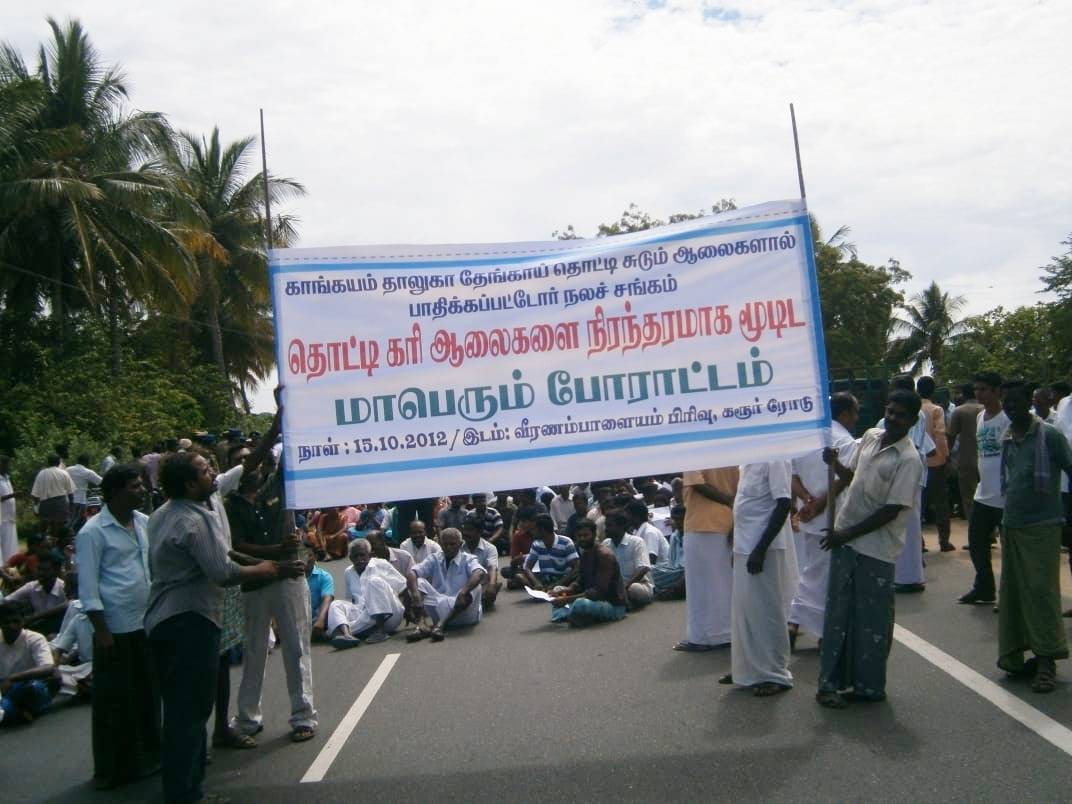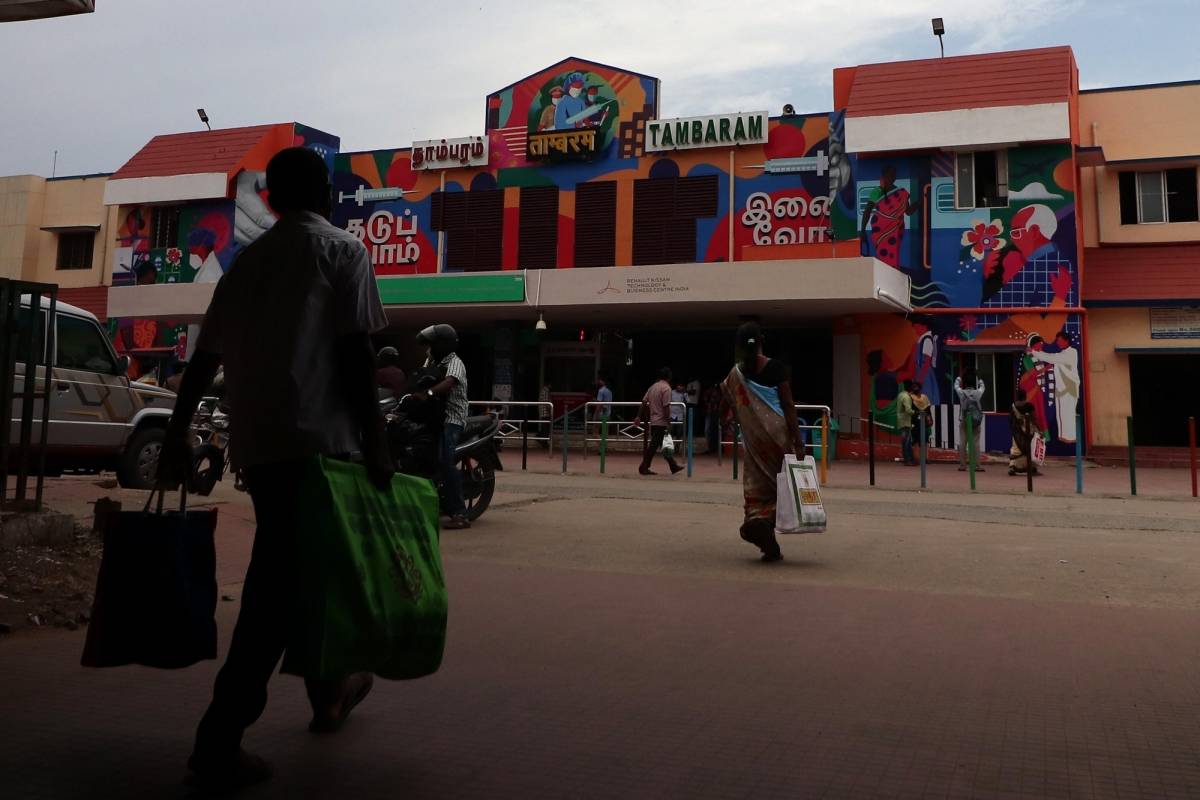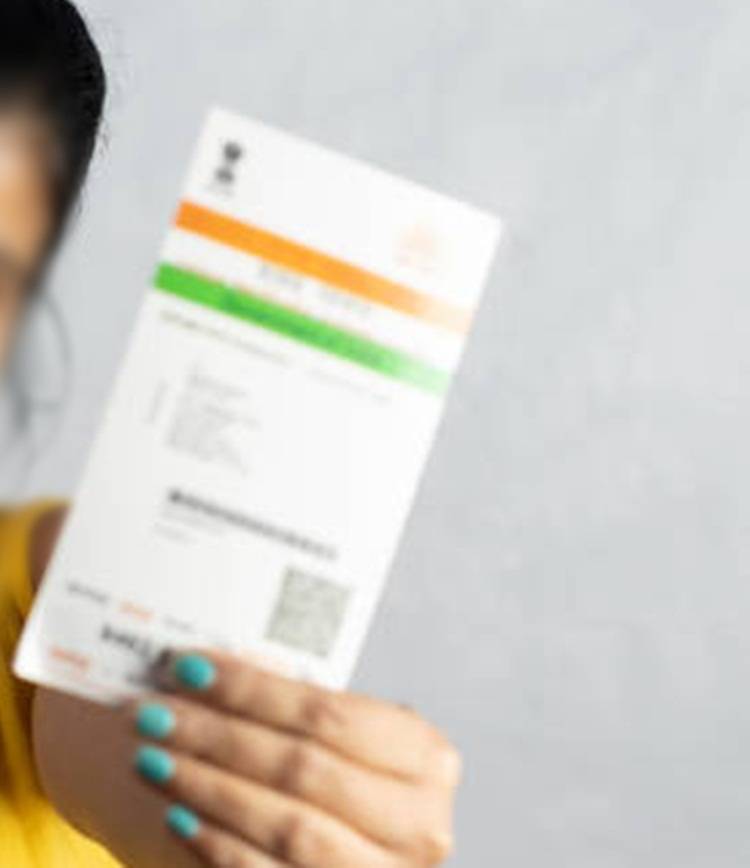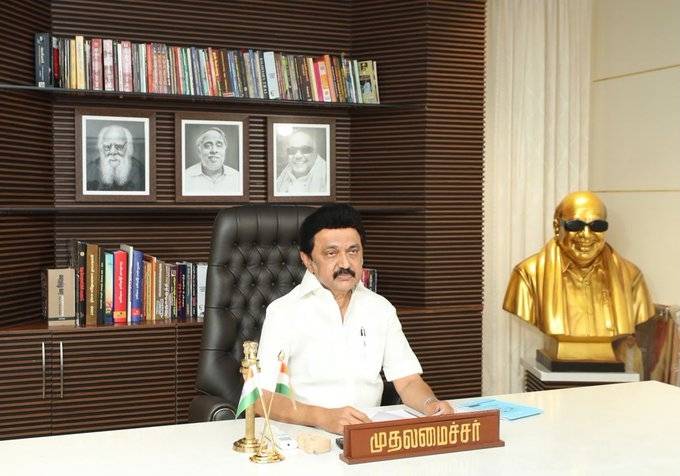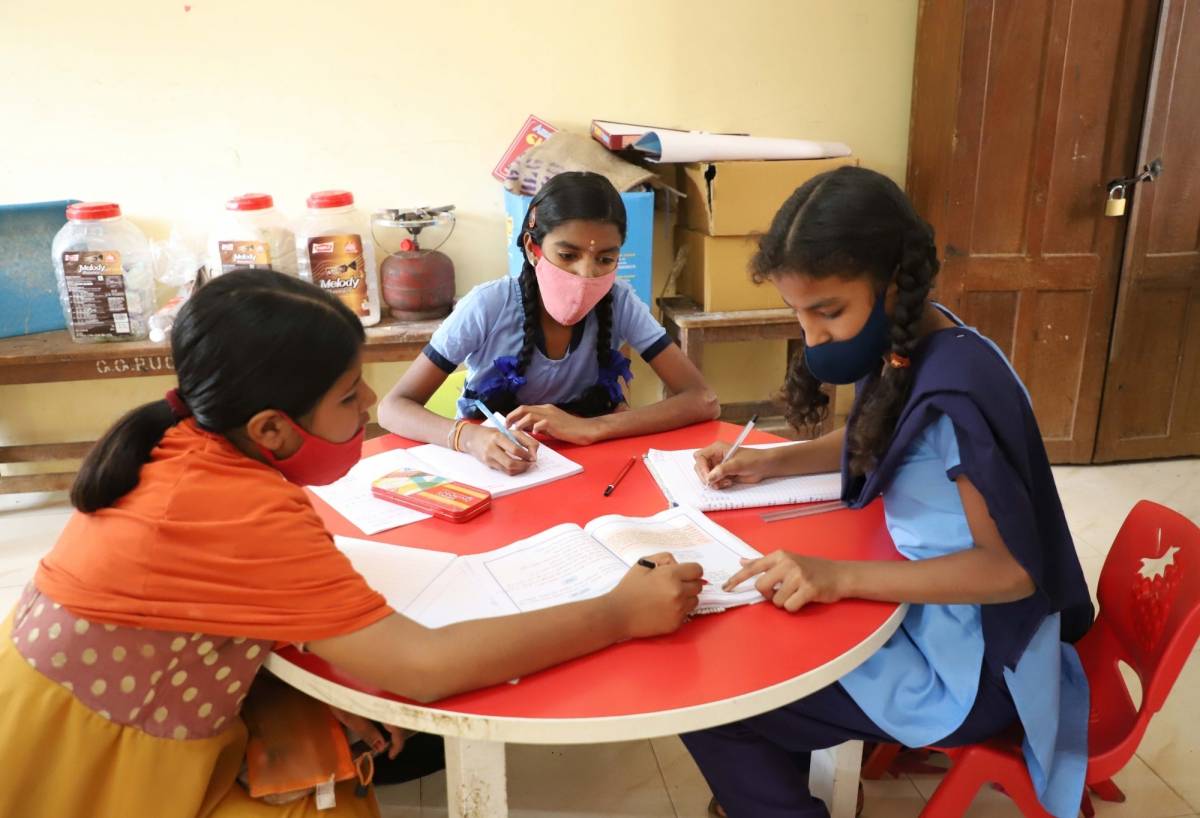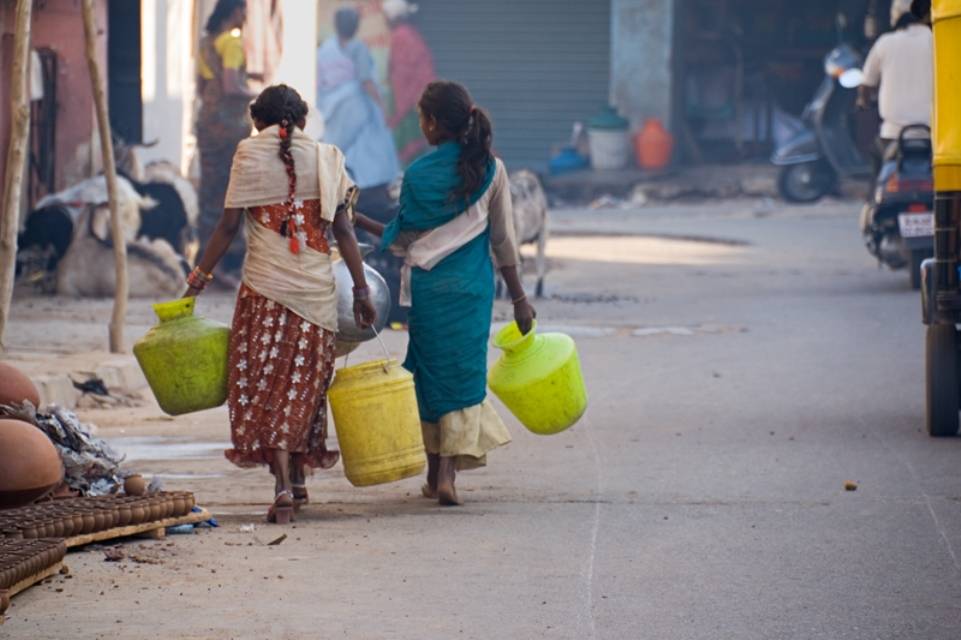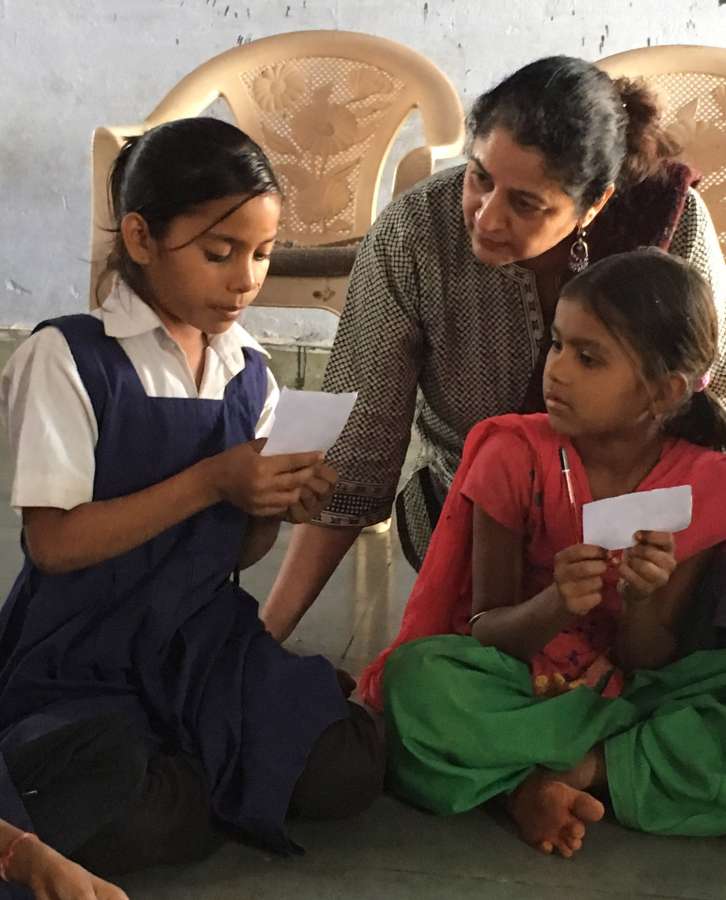But their decade-long battle shut down all the charcoal mills in the belt, stopped pollution to their groundwater, and saved their cattle and agriculture…reports Gowthami Subramaniam
Kumar is a trader who buys coconuts from farms, dries them and sells copras (dried coconut kernels) to the hundreds of coconut oil mills that operate in the Kangeyam belt. This taluk in Tamil Nadu’s Tirupur district is known for its lush coconut farms and coconut-based industries, including those processing the nearly 500 tonnes of coconut shells which are generated as waste each month in the region, the 58-year-old said.
“Now, there’s an emerging market for coconut shell powder abroad and we are also exporting it,” Kumar said.
At the turn of the millennium, however, the local market was dominated by charcoal mills. Earlier paper factories and cement factories used to buy coconut shells to be used as firewood but they couldn’t absorb the growing mountain of waste generated by the ramp-up in coconut production.
When the charcoal mills started operating here on a full scale in the 2000s, little did the villagers know that their groundwater would soon start smelling of smoke, turn dark, contaminated with ash and become undrinkable. But their decade-long battle shut down all the charcoal mills in the belt, stopped pollution to their groundwater, and saved their cattle and agriculture.
When the charcoal mills began functioning as a cottage industry in the region in the 1990s, Karthikeyan, the organiser of the protests, did not think that within a few years it would grow from burning roughly 2 tonnes of coconut shells per week in a few ‘pot pits’ (a small pot buried underground to burn the shells) to whopping 10 tonnes every day in each of these massive pits. The 45-year-old said that the pits, shaped like wells, are open and usually up to 7 feet wide and run 25 feet deep.
Impact on water quality and level
“Once the shells were burnt, a huge amount of water was flushed into the pit. The charcoal was sold for activated carbon, and the remaining water and ash permeated the soil into the groundwater,” Karthikeyan told 101Reporters. “If the burnt shells were naturally allowed to cool, the process wouldn’t require much water. But to guarantee profits, often as high as 10 times the cost, huge amounts of water were splashed for faster results.”
The excessive smoke from the charcoal mills was causing respiratory problems and eye irritation among residents in the area, recalled Balasubramani (60), treasurer of the protest groups. When their drinking water was contaminated, even the cattle refused to consume water from the borewells. This eventually became a huge financial burden for farmers who had to spend between Rs 1 lakh and Rs 2 lakh to purchase water from tankers for their cattle, he said.
Already in 2005, people had started petitioning for the closure of the charcoal mills. Karthikeyan said that by 2008, in Veeranampalayam alone (a panchayat with a population of around 3,500), there were seven units with a maximum of 22 pits per unit. As there were no restrictions in place, each pit would burn about 10 tonnes per day and use 12 kilolitres of water per pit to douse the fire.
When their groundwater turned blackish red and started tasting of smoke in late 2012, people from 22 villages around the mills staged various protests demanding their shutdown. They formed a union for the welfare of all those who were affected by charcoal mills.
United in protest
P Thangavelu from Veeranampalayam panchayat, who headed the protests recalled: “We had attended public grievance redressal meets every Monday to meet the collector. Every time, we were promised that action would be taken, but nothing was happening in reality.”
The villagers then passed a Gram Sabha Resolution on August 15, 2012, demanding the closure of these units. The resolution said the mills should not procure any additional coconut shells, and that their operations would have to come to halt within 45 days. Veeranampalayam panchayat president Gandhimathi wrote to all the units demanding that they shut down permanently, which the mill owners countered. The matter then went to the Madras High Court, with five people adversely affected by the mills approaching the court as plaintiffs against the mill owners.
Further protests and roadblocks by over 2,000 villagers drew the attention of the Tamil Nadu Pollution Control Board (TNPCB), which shut down all the charcoal mills in the panchayat after examining the polluted groundwater. They have been closed ever since, although the mill owners continued the legal battle and sought police protection to run the units.
After the high court denied their request, the pollution control board framed guidelines for the operation of the units. In its report submitted on November 27, it suggested the ban of all the mills’ below-ground-level operations and having them shifted to above ground-level units with elevated tanks. The mill owners refused to accept the order, and the case was forwarded to the National Green Tribunal (NGT) by the end 2012.
The process, however, was far from smooth, with politicians supporting the wealthy mill owners and the police booking the protesters on several counts, said Karthikeyan.
Balasubramani added: “We spent between Rs 15 lakh and Rs 20 lakh to get anticipatory bail for 15 of us during the protests. We had to carry on with our protest, ignoring the threats by the police.”
Green tribunal ensures justice
The joint committee constituted by the NGT on February 29, 2020, declared that to continue natural restoration, the industries wouldn’t be allowed to operate with the existing underground pit technology and were liable to pay environmental compensation of Rs 20,15,800 “for causing damage to the agricultural land”.
All the five plaintiffs received roughly Rs 1,00,000 as part of the compensation, and Rs 6,00,000 was allotted to the construction of a drinking water tank for Veeranampalayam Panchayat. The report also upheld the authority of the panchayat in deciding whom to grant licences, keeping in mind the health of the villagers.
According to current panchayat resident Umanayagi, the underground water has still not returned to its natural potability, and the panchayat has not been permitting charcoal mills using overground technology to operate here either. With the compensation of Rs 6 lakhs received via the compensation ordered by the NGT, a drinking water tank with pipelines to neighbouring farms is being constructed at Pallavaralayampalayam in Veeranampalayam panchayat.
After more than a decade of suffering, the people of Kangayam taluk earned their right to pollution-free lives. The NGT report forbidding the operation of these units using outdated technology inspired people from Dindigul, Palladam and Udumalpet against illegal coal mining, as well, says Karthikeyan. The villages stood up for themselves and not only ensured their right to clean water but also reinforced the rights of panchayats in upholding the interests of the people.

